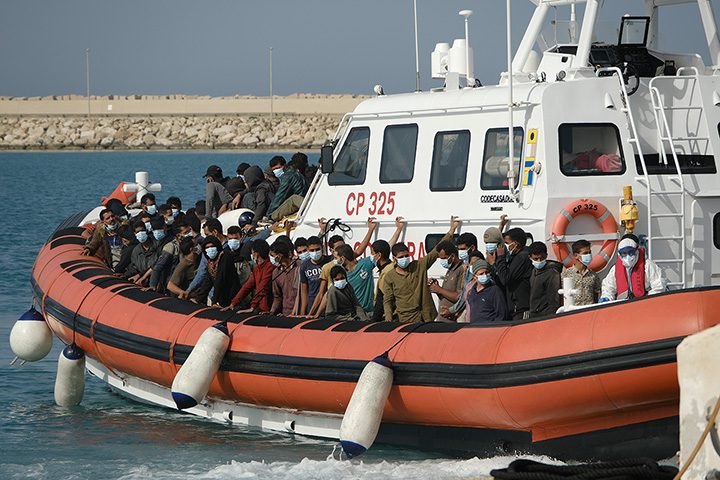The month of September ended in tragedy for several families in the small coastal city of Zarzis in southern Tunisia. Around 18 young people went missing during an attempt to reach Europe, believing a tiny boat would carry them to a land of more opportunity. Yet, like many before them, they never reached their destination or made it back home. Instead, fishermen recovered several of their floating bodies after their families’ calls on various government agencies to launch search and rescue patrols went unanswered. The incident sparked tension and protests in Zarzis against a dysfunctional national government, which continually fails to meet people’s basic demands and pushes young Tunisians into desperate gambles at sea.
A political deadlock
Zarzis has not been the only venue for protests, lately. On October 15, the capital, Tunis, witnessed one of the largest recent demonstrations, organized by two of the major opposition parties. Thousands gathered to denounce President Kais Saied’s move to consolidate power in the middle of an economic crisis marked by shortages of fuel and food. In July 2021, after nearly two years in office, Saied suspended the parliament and dismissed the government in a move that critics have called a “coup d’etat.” This step was supported by many Tunisians after a long period of frustration with the failure of political elites to provide economic and political stability for the country. According to a monthly opinion poll, more than 94 percent of Tunisian respondents in August 2021 supported Saied’s actions. Among those surveyed, 82 percent expressed trust in the president, compared to only 30 percent for July, before the coup. In the same poll, 87 percent of respondents expressed distrust in Rachid Ghannouchi, the speaker of parliament and leader of the Islamist party Ennahda. However, while support for Saied is high, overall trust in the government he leads is falling and the perception of corruption is endemic (see figure below).
Figure: How much trust do you have in the government?
Source: Arab Barometer Wave V (Oct-Dec 2018) and Wave VI-Part3 (Mar-Apr 2021), https://www.arabbarometer.org/survey-data/data-analysis-tool/.
Saied used the coup and absence of parliament to monopolize power while he tasked a committee with proposing a new constitution. While a public referendum for the new constitution was held in July and received more than 96 percent of votes in favor, less than one-third of the electorate turned out. The lack of broad participation is indicative of widespread frustration and apathy with the direction of Tunisian politics. Although new parliamentary elections are slated for December 17, questions of electoral integrity remain high and yet-to-be-announced amendments to the electoral law are expected. More than ten years after the 2011 revolution, it is clear that the tumultuous political environment and backsliding away from the democratic trajectory is further contributing to people’s aggravation and despair.
An economic mess
As Tunisia’s political challenges continue, the country is also suffering from several structural economic challenges deepened by the COVID-19 pandemic and its accompanying restrictions. According to the Arab Barometer’s Seventh Wave of polling during October-November 2021, the largest share of respondents—39 percent—listed the economic situation as the most significant problem facing the country, followed by corruption at 28 percent.
Indeed, public debt is estimated to exceed 82 percent of GDP for 2022, compared to 68 percent in 2019, financing a crippling budget deficit driven by a large public wage bill and an untargeted subsidy system for food and fuel. Despite persistent calls from the International Monetary Fund (IMF) and the World Bank for economic reforms to cut public spending, previous governments avoided such a move, fearing it could cause recurring but manageable protests from Tunisia’s General Labour Union to spread to the broader populace. At the same time, the private sector struggles with structural bottlenecks and excessive bureaucracy that impedes the startup of new businesses, as well as investment in innovative and competitive industries.
With a public sector stretched beyond capacity and an inefficient private sector, the labor market is not able to absorb all the job seekers. Unemployment rates are consistently far above regional and global averages, especially among youth (38 percent in 2021) and women (24 percent). Tunisians with high education levels are not spared from unemployment either, flagging additional labor market issues including a skills gap between the labor market demand and supply. That said, many who cannot afford to be unemployed are forced to join a precarious and vulnerable informal sector lacking in labor protections. Recent estimates suggest that 54 percent of the working population are already in the informal sector.
Walking through the streets of the various towns and cities of Tunisia, it is not hard to observe such vulnerability and despair among a majority of Tunisians who are not able to even meet their basic needs. Half of the respondents to the Arab Barometer Wave VI reported that they ran out of food and did not have the means to get more during the spring of 2021. The situation is even more dire since the country is experiencing a serious shortage in several subsidized goods, including fuel, sugar, and vegetable oil, prompting the IMF to pledge a preliminary $1.9 billion loan to lessen this crisis.
With no relief expected in the near future, Tunisians are becoming increasingly pessimistic, with half of respondents to a September poll believing the country is headed in the wrong direction, compared to only 23.5 percent immediately after the July 2021 coup. Women, youth, and lower income groups—the most vulnerable segments of society—are the most pessimistic. Consequently, more Tunisians are giving up on the country and considering leaving, with 45 percent saying they would leave in 2021 compared to 33 percent in 2018. Youth, in particular, are increasingly willing to migrate—65 percent in 2021, compared to 55 percent in 2018. Unsurprisingly, 45 percent of those thinking of leaving are willing to do so illegally. In fact, the Tunisian National Guard reported stopping more than 7,000 attempts by Tunisians trying to reach Italy illegally during the first eight months of this year, while more than 500 persons have been missing since January 2022. It is clear that the tragedy that befell Zarsis in September is not unique and will continue to recur elsewhere in Tunisia without serious efforts by the government to address the country’s dire economic situation.


